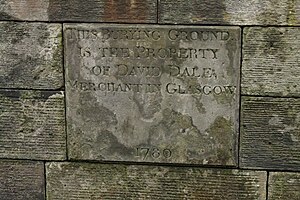David Dale
[1] He was a successful entrepreneur in a number of areas, most notably in the cotton-spinning industry, and was the founder of the cotton mills in New Lanark, where he provided social and educational conditions far in advance of anything available anywhere else in the UK.Robert Owen, who married Dale's daughter, Caroline, in 1799, used New Lanark to develop his theories about communitarian living, education and character formation.[citation needed] His father apprenticed him to a handloom weaver in Paisley & then he became an agent in Hamilton and, later, Cambuslang – putting out yarn to be woven and collecting the finished cloth.He arrived in Glasgow c1763 as a clerk to a silk merchant and began his own small business in the High Street, importing linen yarns from France and the Netherlands.In 1777, at the age of 38, he married 24 year old Anne Caroline (Carolina) Campbell, whose late father had been the Chief Executive of the Royal Bank of Scotland.In 1783 he joined Edinburgh businessman Robert Scott Moncrieff in setting up the first Glasgow agency of the Royal Bank of Scotland – a business arrangement possibly assisted by his wife's family connections.In 1783, there was an opportunity for Dale to extend his reputation and influence with the establishment of the Glasgow Chamber of Commerce Archived 24 May 2016 at the Wayback Machine, the first of its type in Britain.According to one source, Dale by this time had become:...the prosperous Glasgow merchant who, by virtue of pure force of character and intelligence, had fairly broken down that wall of distinction which once separated him from the great tobacco and sugar lords and could now wear his cocked hat jauntily, display his silver knee buckles showily and take the place of honour on the crown of the causeway with the proudest of them all.Men and boys were sent from New Lanark to Cromford for initial training and the mills began spinning in early 1786, at which point both Dempster and Arkwright left the partnership, leaving Dale as the sole owner.The children looked cheerful and happy with rosy cheeks and chubby countenances, and I found a variety of excellent regulations established for health, morals and knowledge.For I am warranted in affirming that many now have stout, healthy bodies and are of decent behaviour who in all probability would have been languishing with disease and pests to society had they not been employed at Lanark cotton mills.Several historians have commented that Owen exaggerated the problems that he found at New Lanark, downplaying Dale's innovations in order to boost the importance of his own, and have, to varying degrees, acknowledged the achievements of both men.The main offices of the business were in St Andrew's Square, Glasgow and Dale continued to live in Charlotte Street in the city.Dale was also a director or manager of various charitable projects throughout the city, and newspaper reports of the time talk of his charity, his kindness, his benevolence and his good deeds and public works.These included the Howard Fund for prison reform, an injured servicemen's charity, the Royal Northern Infirmary in Inverness, Perth Academy and the newly-formed Glasgow Humane Society Archived 25 October 2016 at the Wayback Machine, where he agreed to become a director and undertake fundraising on their behalf.[citation needed] For twenty years he was a director of the Town's Hospital, the equivalent of a charity workhouse for the poor, orphans, elderly, sick and, until 1814, the mentally ill, serving on the institution's Manufacturing Committee.The abolitionist movement in Britain was led by Thomas Clarkson and William Wilberforce, who oversaw the actions of the London Society, which sent representatives across the country seeking support for anti-slavery petitions.In the same year, he bought shares in the newly-formed Sierra Leone Company which sought to establish a colony of freed slaves in West Africa.At a General Meeting of the Glasgow Society on 1 February 1792, with Dale in the Chair, the members resolved;…that the traffic in the human species is founded on the grossest injustice, is attended with the utmost cruelty and barbarity to an innocent race of men and is productive of ruin and desolation of a country which the efforts of the well-directed industry of Great Britain might contribute to civilise.[30]When Dale died at his home, Rosebank House in Cambuslang, Lanarkshire[4] on 7 March 1806, huge crowds of mourners lined the streets of Glasgow.




David Dale (disambiguation)StewartonAyrshireCambuslangLanarkshireRamshorn CemeteryRobert OwenNew LanarkTom DevinerunrigsPaisleyGlasgowRoyal Bank of ScotlandWayback MachineJohn Glassfordtobacco lordsRichard ArkwrightGeorge DempsterCromfordWilliamDorothy WordsworthSamuel ColeridgeworkhousesBlantyreEast India CompanyCatrineSpinningdaleDalmarnockTurkey RedBarrowfieldRuchillParkheadDissenting (Secessionist) ChurchGlasgow Royal InfirmaryUnited StatesSouth AmericaWest Indiesslave labourBritish abolitionist movementThomas ClarksonWilliam WilberforceLondon SocietySierra Leone CompanyWest AfricaOxford Dictionary of National Biography